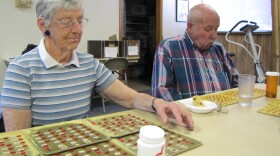As medical technology has improved, people are living longer, often well past expectations.
If you’re a man, the average life expectancy is now 75. It's 80 for women, with more living well into the upper 80s and 90s. But that’s leading to other problems: Long life is stripping away savings and making it harder to make ends meet in the Golden Years.
Brian Litwak is an example. The 74-year-old is good-humored, stubborn and a little bit scared.
He talks about all three as he pulls into a supermarket parking lot in Tucson on a cool Friday morning.
He’s looking for chocolate pudding, sugar-free. Even if he has to add corn-starch, per doctor’s orders.
“See look at this. Isn’t this amazing?” he said. “And it’s just what I can eat. And they’re delicious; not even corn-starch can spoil the taste.”
Chocolate pudding and a four pack of frappucinos. That’s his indulgence.
“But now these are the Golden Years? Well, I’d like to have, you know, those puddings because they’re good and that frappucino stuff because I like them,” he said. “And I’m not going to have them because I can’t afford them again? That’s making me very angry.”
Litwak’s a retired schoolteacher from Los Angeles who specialized in children with high IQs. Even though he suffers from diabetes and a heart condition, his retirement plans were all worked out: A good pension and a solid savings account.
Then a bad investment by family members changed all of that. He lost his savings and now lives in an assisted living home called Handmaker Jewish Services for the Aging.
Brian expects he’ll grow sick enough at some point that even his pension won’t sustain him.
“I’m going to outlive my money. Because even the men are living to at least 75, 76 years old,” he said. “So I actually have two years more, according to the statistics.”
“We are still functioning on a plan that was meant for people with life expectancies much younger," she said.
Bingham sees it at the hospice every day: Older people living longer than they were prepared for. And it’s not a problem for the future.
Between 2000 and 2010, the population of seniors 85 and older exploded by 52 percent in Pima County. When you tally those 65 and over, they collectively make up nearly one-fifth of the county.
“And it is eventually going to catch up with us. We’re in this crunch right now," Bingham said.
Arizona and some other states do offer long-term care when resources have run out, but its offerings are very limited. It's really an option of last resort.
Many people don’t even know about these programs. In Arizona, it’s known as the Arizona Long Term Care System.
"You know, I talked to a lady not too long ago who said she only had $47 in her savings account. It’s just dire," Bingham said. "The finances for some people are just extremely limited. And so you can imagine, it puts a burden, and at this time when it's already the end of life. It's one of the most difficult times in anyone's entire history.”
And the problems that come with old age haven’t gone away. In Pima County, 71 percent of seniors report at least one chronic condition – Alzheimer's Disease, hip fractures, arthritis, vision problems, heart disease.
Deborah Adams is a director at the Pima Council on Aging. She said it's an entirely new demographic, and it’s one that many communities are not addressing. She counts off on both hands what's needed.
"Looking at transportation, looking at housing, looking at recreational opportunities; looking at healthcare,” Adams said. “Looking at how communities are laid out so there’s easy access to medical facilities, pharmacies, to grocery stores.”
Back at his apartment, Litwak worries it’s already catching up to him.
"Older people see everything that happens through fear and anxiety,” Litwak said. “Because they don’t know if they’re going to go to heaven, if there is a heaven. So that makes them frightened.”
But Litwak said growing old and poor scares him even more.







